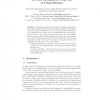Free Online Productivity Tools
i2Speak
i2Symbol
i2OCR
iTex2Img
iWeb2Print
iWeb2Shot
i2Type
iPdf2Split
iPdf2Merge
i2Bopomofo
i2Arabic
i2Style
i2Image
i2PDF
iLatex2Rtf
Sci2ools
WOTE
2010
2010
On Some Incompatible Properties of Voting Schemes
Abstract. In this paper, we study the problem of simultaneously achieving several security properties, for voting schemes, without non-standard assumptions. More specifically, we focus on the universal verifiability of the computation of the tally, on the unconditional privacy/anonymity of the votes, and on the receipt-freeness properties, for the most classical election processes. Under usual assumptions and efficiency requirements, we show that a voting system that wants to publish the final list of the voters who actually voted, and to compute the number of times each candidate has been chosen, we cannot achieve: – universal verifiability of the tally (UV) and unconditional privacy of the votes (UP) simultaneously, unless all the registered voters actually vote; – universal verifiability of the tally (UV) and receipt- freeness (RF), unless private channels are available between the voters and/or the voting authorities.
| Added | 31 Jan 2011 |
| Updated | 31 Jan 2011 |
| Type | Journal |
| Year | 2010 |
| Where | WOTE |
| Authors | Benoît Chevallier-Mames, Pierre-Alain Fouque, David Pointcheval, Julien Stern, Jacques Traoré |
Comments (0)

